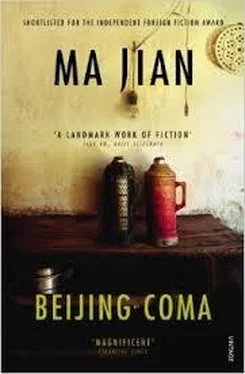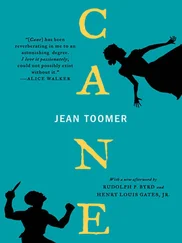She said, ‘I love you.’ I said, ‘Me too.’ I inhaled her breath then moved closer to her and sucked her warm tongue. My legs rubbed against hers, and before I knew it, I’d thrust myself inside her. The shuddering darkness became a wind that propelled me back and forth, shaking me into a trance. I felt my neurons charge into her bloodstream. My throat tightened and my eyes burned. ‘You’re killing me, killing me!’ I cried, falling into an ecstatic stupor.
At last she pushed me away, moaning: ‘You’re hurting me… get out…’ She pressed her hand against my thigh and I stopped moving. ‘You’re very bad,’ she said. Her words hovered for a while in the darkness.
‘You’re very good,’ I said. ‘You’re my woman…’
‘There’s nothing good about me now. You’ve broken me…’ I could tell that she was talking through pursed lips.
Even with my eyes wide open, I couldn’t see a thing. The whole room seemed to be sliding and flowing.
Men and women are dark fluids. It’s only when they make love that they’re able to flow out and fill the crevices between each other’s bodies and souls. If the fluids stay locked inside for too long, they eventually dry up.
The hotel receptionist banged loudly on the door and told us we must sleep in separate rooms. She said that the police had come and checked the register at midnight, and informed her it was against the law for unmarried couples to share the same room. I grabbed my blanket, groped my way out and went to sleep in the dorm next door.
I fell asleep and dreamed that the giant Mao Zedong face that hangs in Tiananmen Square began to smile. A crowd of millions knelt below it, their heads bowed low. A couple of people courageously looked up and saw Mao waving his arms in the air and laughing wildly. Then the crowd disappeared and became a vast, empty desert.
Your white blood cells sweep away small blood clots and particles of fat, and begin to shroud those memories as a creeper shrouds a brick wall.
A photograph taken in our flat flashes before my eyes. At first it’s a black-and-white image, then slowly the colours seep through. In the background are the ten volumes of Mysteries of the World lined up on the wooden cabinet. My brother is standing next to my mother in the foreground, with a forced smile on his face.
When I opened the envelope my brother sent me, this photograph fell out. I was sitting at a small wooden desk in my dorm at Southern University. My brother must have been sixteen by then. Now that my father was dead, I felt responsible for him. I picked up my pen and began to reply to his letter.
I remembered one night, when we were much younger, he refused to go to sleep after I turned the lights out, insisting that I explain to him why Chinese ants are red and American ants are black. He said that black ants, which bite people, are braver than red ants, so logically speaking they should be Chinese not American. I refused to answer him, so to punish me he stole a pair of my socks and hid them under his pillow.
In the envelope, there was also a letter from my mother. She wrote that, for the first time in more than twenty years, her company had been permitted to perform Western operas again. They were now rehearsing Carmen , and she’d been chosen to sing soprano in a four-voice aria. She was very excited about this, and had begun to go jogging every morning in an attempt to lose weight. ‘Your father would have been very proud of me,’ she wrote. ‘My voice has improved so much recently. It’s as good as it was when I was twenty. I can even reach a high C.’ When she used a fountain pen, my mother’s handwriting looked quite elegant.
I pictured her face going red as she trilled floridly up the scale, so in my letter I reminded her to keep drinking infusions of the dried arhat fruit I’d sent her. ‘You should practise in the park,’ I wrote. ‘The air in the flat is too dusty. It will damage your voice.’
My mother always peppered her letters with political exhortations. ‘You have high ambitions and ideals, but you must take care to align yourself with Party policies and keep up with the changing political climate. If you focus exclusively on your studies and fail to achieve any political accomplishments, you will suffer your father’s fate…’
In my letter back to her I retorted, ‘Dad didn’t commit any mistakes. I keep telling you that, but you never listen. If he’d done anything wrong, the government wouldn’t have rehabilitated him… What our country needs now is knowledge, not ideology. Half of the professors in our university are rehabilitated rightists. The era of class struggle that you still cling to is a thing of the past. The only students who want to join the Party now are a few country bumpkins who are afraid of being sent back to their villages after they graduate…’
In fact, I knew that my mother’s desire to join the Party was motivated by thoughts of self-preservation. She was like those victims of natural disasters who instinctively seek safety in the hills.
‘I think Dai Ru has got himself a girlfriend,’ my mother wrote. ‘I heard that he took a girl to see a fashion show. Only couples who are going out together do things like that. The tickets were very expensive. When I asked him about it, he denied that he’d gone. You must have a serious talk with him, and tell him where you went wrong. I don’t want him to make the same mistakes as you did.’
I thought back to my interrogation in the police station in 1982, and realised how much society had changed. Back then, you could get arrested for copying out a book that contained a few erotic passages. But now, just two years on, pornographic films were being shown in privately run video rooms on every street corner. Although it was against the university rules for students to date each other, no one paid any notice. In the holidays, when the campus was much emptier, girls and boys would move into each other’s dorms. Students from Hong Kong and Macao could afford to rent rooms in the town, which gave them more privacy. When you have money, you have freedom. The government had recently announced that in the Special Economic Zone of Shenzhen, citizens were allowed to buy their own flats. Private ownership had reared its head at last in Communist China. I didn’t want to interfere in my brother’s life. All I told him was that he should start making plans to study abroad.
I found letter-writing a chore, but my mother wrote to me every week, so, now and then, I had to take the time to reply to her.
Wang Fei was fast asleep on the bunk above me. He always slept with his leg dangling over the side. It drove me mad.
‘Pull your leg back up or I’ll chop it off!’ I shouted. ‘It’s time you got dressed, anyway. We’ve got a class to go to in a minute.’ The class I was referring to was going to be held in the laboratory. Students from the medical and science faculties were to observe the dissection of the corpse of an executed prisoner.
I’d planned to help A-Mei move into her new room before the class. She was transferring to a block the university had just built for Overseas Chinese students where the rent was five hundred yuan a term. But she’d changed her mind and decided to postpone the move until the afternoon.
On 1 October every year, prisoners on death row were executed in celebration of National Day. With the improvement of surgical skills and the liberalisation of the Chinese economy, any patient with enough money could now purchase themselves the organs of executed prisoners. The organs of the corpse that was delivered to us that morning had been used for China’s first successful heart-lung transplant. There had been an article about the operation in the newspaper the previous day, and now the heart and lungs were working away inside the body of a Hong Kong businessman.
Читать дальше












